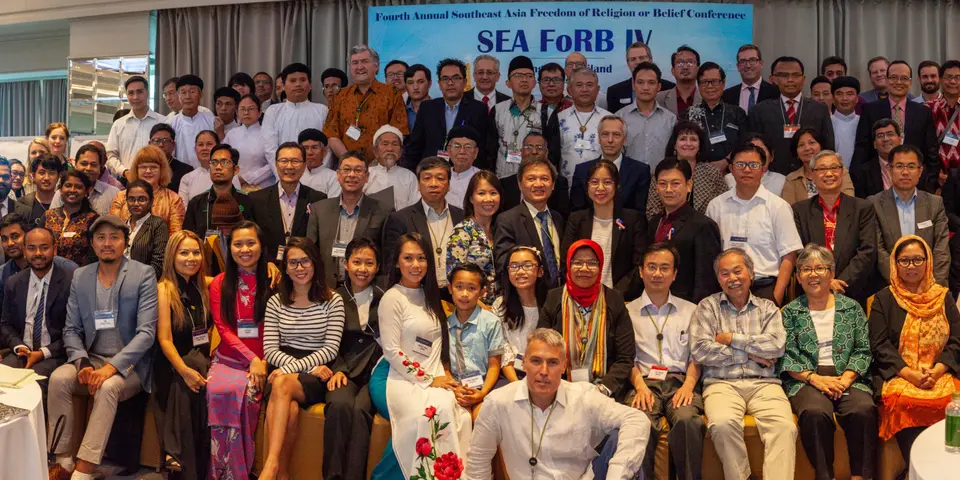
4th Southeast Asia Freedom of Religion or Belief (SEAFoRB) Conference
September 10, 2018

More than 100 prominent advocates and stakeholders working on the promotion and protection of freedom of religion or belief (FoRB) around the globe gathered in Bangkok, Thailand from 17 to 19 August 2018 for the annual SEAFoRB Conference. Now in its fourth year, the event was co-organized by APHR, together with the International Commission of Jurists (ICJ), FORUM-ASIA, Boat People SOS (BPSOS), Christian Solidarity Worldwide (CSW), the International Center for Law and Religion Studies (BYU Law), Stefanus Alliance International (SAI), and the Religious Freedom Institute (RFI).
The SEAFORB assembly, first convened in 2015, is an ongoing project attended by advocates dedicated to the promotion of religious freedom in Southeast Asia. This year, the event focused on how religious freedom can be realized in a region that is facing an alarming deterioration of rights and the rule of law. Participants included the United Nations Special Rapporteur on FoRB, Dr. Ahmed Shaheed, and the European Union Special Envoy for the promotion of FoRB outside the EU, Mr. Jan Figel. Several APHR members and FoRB working group members also played prominent roles in the event, including Kasit Piromya (former MP, Thailand), Kasthuri Patto (MP, Malaysia), and Maman Imanulhaq (former MP, Indonesia).
Some of the discussions included the role of parliamentarians and human rights mechanisms in strengthening FoRB protections, understanding FoRB from a business perspective, and how related freedoms are being curtailed across Southeast Asia through the application of restrictive laws. On the second day of the three-day event, participants split up into smaller focus groups around salient issues impacting religious freedom, such as sexuality and FoRB, preventing incitement to atrocity crimes, the politicization of religion, harmful practices that affect women’s access to justice, and the shrinking of civic spaces in the region.
Before the conclusion of the conference, participants discussed ways forward and recommendations to defend and advance FoRB in the region. Amongst others, it was agreed that there was a need to increase engagement with international and regional mechanisms as a means to pushback against the shrinking of civic spaces in the region. Participants also recognized the importance of enhancing collaboration with parliamentarians and to call on the ASEAN Intergovernmental Commission on Human Rights (AICHR) to implement Article 22 of the ASEAN Human Rights Declaration in line with other international human rights instruments such as the Universal Declaration of Human Rights (UDHR) and the International Covenant on Civil and Political Rights (ICCPR).
A day before the conference, APHR co-organized several side meetings focused on the FoRB situation in Indonesia, Malaysia, Myanmar, and Vietnam. The meetings were an opportunity for participants from these countries to discuss specific FoRB-related concerns, together with several international human rights experts, and to develop strategies to address these challenges – which include a FoRB network for each country. After the meetings, the same country delegations met with the UN Special Rapporteur on FoRB, where they were able to convey key discussions and findings from the side meetings to him.
A full report of the conference, which is being prepared by the co-organizers, will be released in due course.
ASEAN Parliamentarians for Human Rights (APHR) was founded in June 2013 with the objective of promoting democracy and human rights across Southeast Asia. Our founding members include many of the region's most progressive Members of Parliament (MPs), with a proven track record of human rights advocacy work.